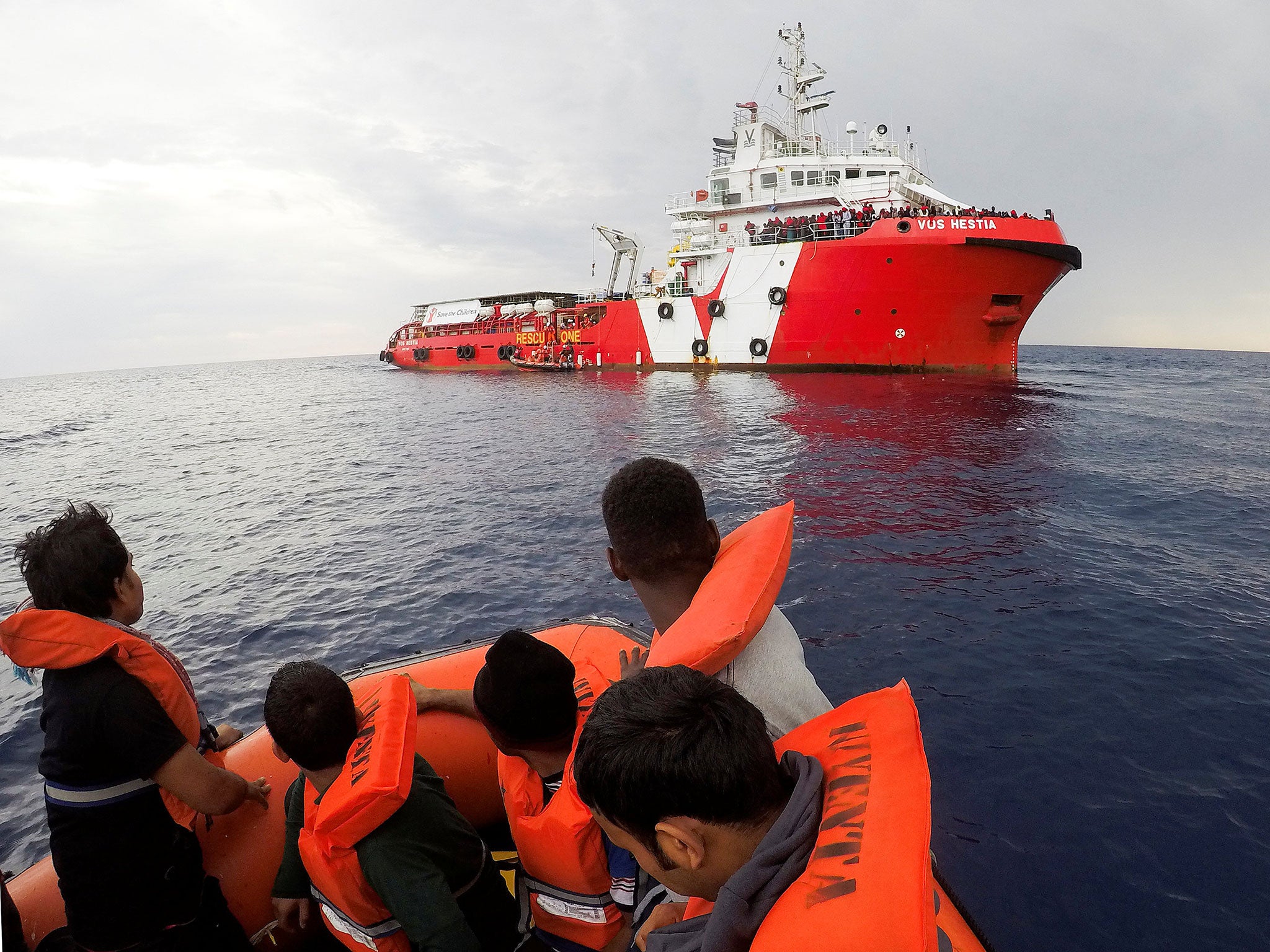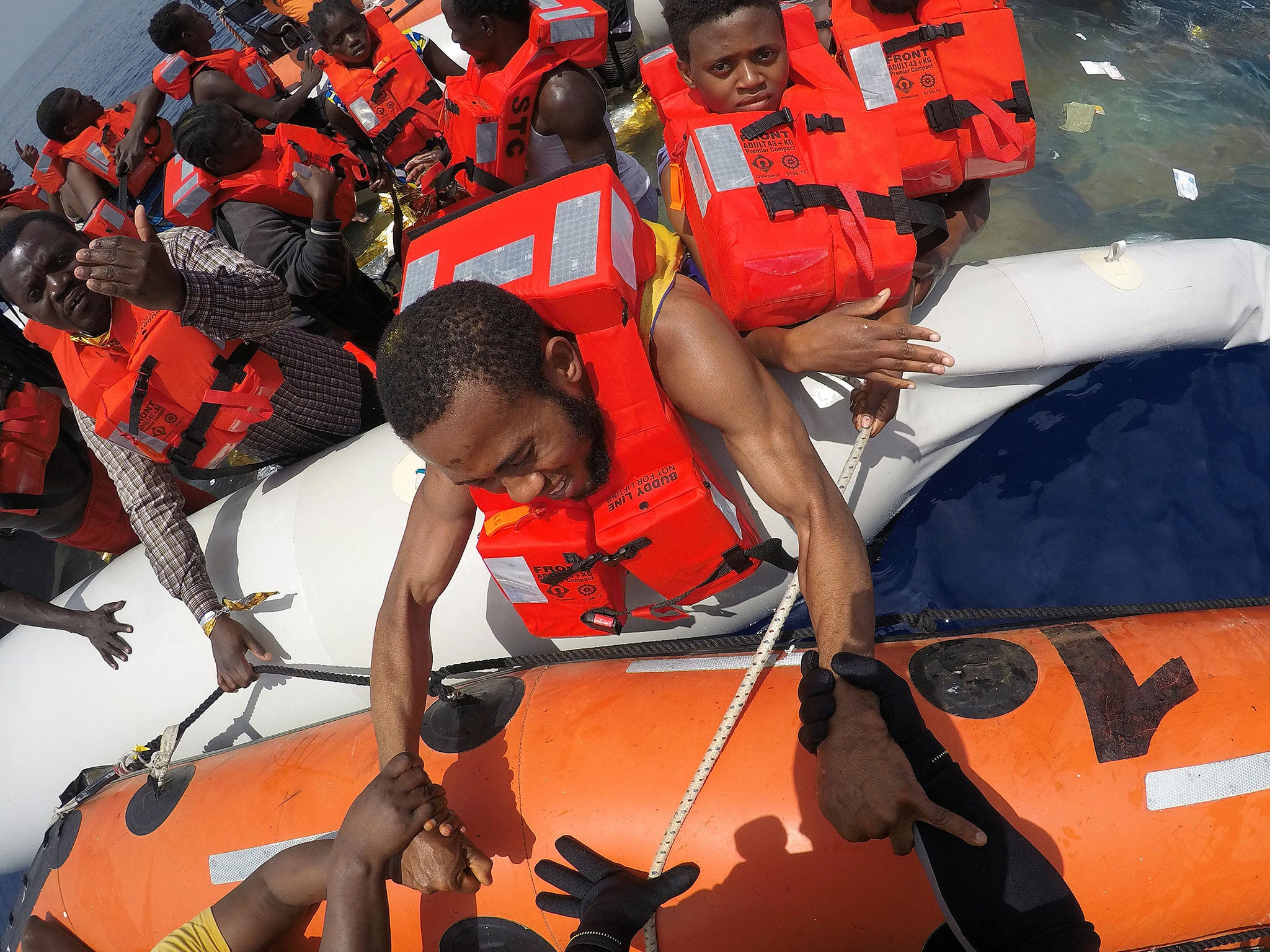Italy's draft code of conduct for refugee rescue ships 'threatens thousands of lives', charities warn
Warning comes after more than 2,300 asylum seekers drown trying to reach Europe in 2017

Your support helps us to tell the story
From reproductive rights to climate change to Big Tech, The Independent is on the ground when the story is developing. Whether it's investigating the financials of Elon Musk's pro-Trump PAC or producing our latest documentary, 'The A Word', which shines a light on the American women fighting for reproductive rights, we know how important it is to parse out the facts from the messaging.
At such a critical moment in US history, we need reporters on the ground. Your donation allows us to keep sending journalists to speak to both sides of the story.
The Independent is trusted by Americans across the entire political spectrum. And unlike many other quality news outlets, we choose not to lock Americans out of our reporting and analysis with paywalls. We believe quality journalism should be available to everyone, paid for by those who can afford it.
Your support makes all the difference.Italian plans to impose a code of conduct on charities rescuing refugees in the Mediterranean Sea “threatens thousands of lives”, humanitarian groups have warned.
A draft of the code leaked to Amnesty International and Human Rights Watch (HRW) would force them to allow police officers on board and return immediately to port, rather than transferring migrants to other ships.
It would also ban rescuers from entering Libyan territorial waters, using lights to signal their location to boats at imminent risk of sinking or communicating with smugglers by phone.
The document, which has not been finalised, threatened to bar any NGOs who do not sign the code from Italian ports, forcing them to journey further carrying passengers frequently including pregnant women, torture victims and infants.
It comes as Italy’s pleas for support from fellow EU nations in redistributing around 200,000 migrants in overflowing government reception centres fall on deaf ears, amid waning political will to support refugees.
More than 2,300 migrants have lost their lives attempting to reach Europe so far this year, mainly on the treacherous route between Libya and Italy, while 105,200 asylum seekers mainly from Sub-Saharan Africa, Bangladesh and Syria have made it to shore.
Humanitarian ships have become increasingly instrumental in rescue operations, picking up more than a third of all migrants rescued in 2017 compared to 1 per cent in 2014, and are struggling to cope with the summer peak.
Jugend Rettet, which is among the groups operating rescue ships off the coast of Libya, told The Independent that forcing vessels to return to land to disembark migrants would take them out of the search and rescue zone “where they are urgently needed”.
NGOs are deployed to boats in distress by commanders in Rome, with smaller ships frequently transferring rescued refugees to larger vessels so they can continue rescues.
“This draft for a code of conduct is a real threat for thousands of people,” said Jugent Rettet’s Isa Grahn, adding that it was “not an option” for the group to have a police officer on board its ship. “Humanitarian work has to be separated from political aims and be protected from political or military intervention.”
The 11-point plan was drafted by the Italian government and first proposed at an informal meeting of the European Justice and Home Affairs Council on 6 July. It has not yet been officially presented to aid agencies, with the Migrant Offshore Aid Station (Moas) saying it had not yet been approached.

Save the Children, which also operates a rescue mission, said it had not been shown the proposals by officials. “We will engage constructively with Italian authorities on any code of conduct that is fully aligned with our mandate to save lives and with International Maritime law,” a spokesperson told The Independent.“Save the Children operates in line with its humanitarian imperative to save lives, in compliance with international maritime law and in full transparency and cooperation with relevant authorities.”
Vincent Cochetel, the UN Refugee Agency’s special envoy for the Central Mediterranean route, said that any code of conduct must be imposed for all actors – not just NGOs.
Speaking at a report launch in Brussels earlier this month, he said that Rome’s maritime rescue coordination centre (MRCC) reviews all ships available to respond to distress calls but “often we see shipping companies switching off their GPS systems in order not to rescue people. Can we have a code of conduct also for these shipping companies?"
“NGOs are out there in the Mediterranean rescuing people because the EU is not,” said Judith Sunderland, associate Europe and Central Asia director at HRW. “Given the scale of tragedies at sea and the horrific abuses migrants and asylum seekers face in Libya, the EU should work with Italy to enhance robust search and rescue in the waters off Libya, not limit it.”
Iverna McGowan, director of Amnesty International’s European institutions office, said the draft code of conduct would “risk endangering thousands of lives by impeding rescue boats from accessing the perilous waters near Libya”.
She characterised the proposals as part of a “concerted smear campaign” against NGO rescue ships, which has culminated in a far-right group calling itself Defend Europe sending its own vessel to disrupt operations in the Mediterranean Sea.
Right-wing politicians have made persistent claims that aid agencies are aiding or even directly colluding with Libyan smugglers without citing evidence, despite two parliamentary committee inquiries in Italy finding no evidence of misconduct.
Academic studies have found no link between rescues and rising Mediterranean crossings and deaths, while a parliamentary report in the UK branded the EU’s anti-smuggling mission a “failure”.
The House of Lords EU External Affairs Sub-Committee found that Operation Sophia, launched to replace the Italian government’s rescue efforts in 2015, “has not in any meaningful way deterred the flow of migrants, disrupted the smugglers’ networks, or impeded the business of people smuggling”.
As reported by The Independent last year, the committee also concluded that the mission was driving refugee deaths by destroying smugglers’ boats and forcing them to switch to unseaworthy dinghies that are launched en masse.
The Lords report said a naval mission was the “wrong tool” to gather intelligence on land-based smuggling networks leading to the Libyan coast, which is now the main departure point for boats heading towards Europe.
It also raised concern over reports of “serious abuses of the human rights of migrants by the Libyan coastguard”, which is being trained by the UK and equipped by the EU as it seeks to gradually unburden itself of responsibility for rescues.
Recent incidents include a near miss between a Libyan coastguard patrol ship and vessel operated by German charity Sea-Watch, gunfire during a rescue and widespread allegations of the beating, torture and robbery of refugees forced back to shore in violation of international law.
The UN has warned of widespread torture, arbitrary detention, rape, forced labour and "slave auctions" in Libya, where people smugglers have set up a lucrative business in the chaos of its continuing civil war.
Join our commenting forum
Join thought-provoking conversations, follow other Independent readers and see their replies
Comments